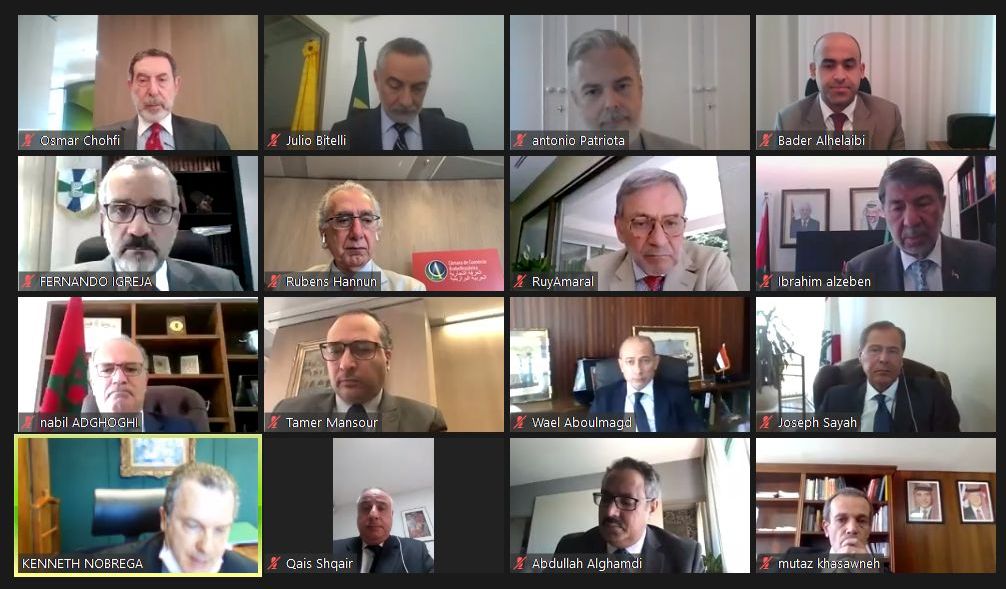São Paulo – Some projects involving Brazil and the Arab countries were suspended or postponed due to the COVID-19 pandemic, but the relations between the two regions have moved forward in several regards, and trade with some markets have even stepped up. Brazilian ambassadors to the Arab countries and Arab ambassadors to Brazil discussed the topic in webinar hosted by the Arab Brazilian Chamber of Commerce on Wednesday (24).
The pandemic impacted the implementation of a direct airline between Brazil and Egypt and caused diplomatic trips between the countries to be cancelled, but on the other hand, Brazilian imports of Arab fertilizers went on unabated, Jordanians have bought more Brazilians products, and Brazil strengthened its position as a food supplier to the United Arab Emirates.

Twelve diplomats gave an overview on the problems that the COVID-19 crisis imposed on the countries where they are based. The discussions were moderated by Arab Chamber International Relations vice president Osmar Chohfi and secretary-general Tamer Mansour. Speakers also included Arab Chamber president Rubens Hannun, Council of Arab Ambassadors in Brazil dean and Palestine ambassador Ibrahim Alzeben, as well as Brazilian Foreign Ministry’s undersecretary for Bilateral Negotiations for the Middle East, Europe and Africa Kenneth da Nóbrega.
The event started emphasizing the importance of the diplomatic work for the relations and trade between the countries. “You have this extremely important responsibility, this economic diplomatic mission where you have to understand the country you represent and the country where you are based, understand the culture, business, economy, social issues, solutions, and create this balance, make these relations work,” Hannun told the ambassadors.
Egypt

In the webinar, Brazilian ambassador in Cairo, Antonio Patriota, said that a direct air route between São Paulo and Cairo would be in the implementation phase if it wasn’t for COVID-19. “It’s one of the few economies in the region and the world that won’t slip into negative growth,” Patriota said, referring to the 2019-20 fiscal year, to end next month, and the next. The country has recently implemented a series of economic reforms supported by the International Monetary Fund (IMF).
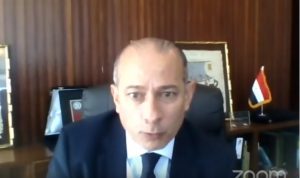
The COVID-19 impacted the country’s economy, although it hasn’t caused any significant setback in the relations with Brazil, Patriota said. But the ambassador believes that things must be boosted to get the most out of Brazil-Egypt relations. The Arab country has a free trade agreement with Mercosur, but the main products that Brazil exports to Egypt were already free of charges before the treaty, he says. “The good trade performance does not necessarily result from the agreement,” Patriota says.
The Egyptian ambassador in Brasília, Wael Ahmed Kamal Aboul Magd, talked about the need of a more balanced trade between Brazil and Egypt. Currently, Brazil exports more to the Arab country than imports from it. “The trade balance has significant figures, but there is an imbalance in our relations – exports from Brazil to Egypt are much higher,” he says. The diplomat also believes that the results from the Mercosur-Egypt are still lower than expected.
Morocco
The Brazilian ambassador in Rabat, Julio Bitelli, said that diversifying exports between the countries is key. “Right now, we still depend heavily on imports of phosphates and phosphate derivatives from Morocco and mainly sell agricultural products such as sugar and maize,” he said.

He said that there is an important effort for diversifying exports. “Our experience here at the embassy in Rabat, with the agricultural attaché, has given important results. We manage to get Morocco to import soy-based products from Brazil and are working with other products too. We have to remember that some taxes are still quite high, and Morocco has free trade agreements with over 50 countries, including US, the European Union, Turkey – all important countries – and this is an additional challenge for Brazilian exports,” he said.
He pointed out his admiration for the measures adopted by Morocco in the fight against the COVID-19 pandemic. “The figures here are quite reasonable and allows for a gradual reopening starting next week, while keeping the necessary cautions, obviously, but Morocco has dealt with the pandemic in an exemplary way,” he said.

The Moroccan ambassador in Brasília, Nabil Adghoghi, agreed with Bitelli that the trade products between the country should be diversified beyond agribusiness. “The automobile and aviation industries are promising, considering Brazilian high competitiveness in these industries and Moroccan rapid growth in both,” he said.
Nabil Adghoghi said he also believes that the agricultural machinery industry is promising and mentioned the strong intention for an agribusiness knowledge interchange cooperation with the Brazilian Agricultural Research Corporation (Embrapa). “Ours is a semiarid region, we lack water, and Embrapa has developed a high expertise in the Brazilian Northeast. And it would be good to sell this knowledge to the Arab agricultural businesspeople,” the ambassador said.
Jordan
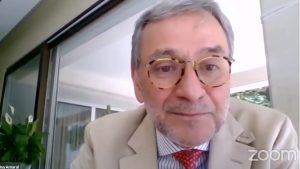
Brazilian ambassador in Aman, Ruy Amaral, talked about how the year of 2019 was for the trade between the countries. “It was a great year for Brazil-Jordan trade. Brazilian exports were up by 26%, reaching a historical high and fetching USD 330 million, while exports from Jordan to Brazil skyrocketed by 230%, and year-to-date through May 2020 we saw a 1,780% increase. This is great news – our trade is still imbalanced but far less imbalanced than a year ago, and we know that a balanced trade is healthier, more sustainable,” he said. Almost all exports from Jordan are fertilizers, Amaral says, while Brazil exports mostly beef, poultry, maize, pulp and coffee.
Amaral also expressed his admiration for the way that the Jordanian government has dealt with the pandemic. “On March 15, when the country had just ten cases, the government said that starting on March 18, the country would be in lockdown. Public transport was suspended. The entire commerce and productive activity were shut down, most government agencies were closed, and cars were barred. People could only go on foot to the markets and pharmacies near their homes, which were the only things that remained open,” he said.
He pointed out still a curfew was implemented from 6pm-10am and the entire weekend, and that 99% of the population complied with it. “Thus, the numbers greatly improved. To give an example, in the last three months, no new COVID-19 cases were recorded in Jordan.”
Since early May, life started to get back to normal. “Now, life in Aman is almost normal – with some precautions, obviously, as it should be, but commerce and productive activities are working normally. I believe this was the result of a very brave, successful policy,” he said.
Kuwait
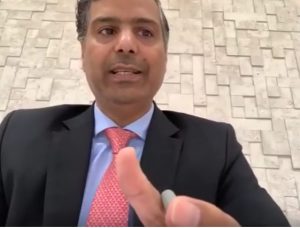
Kuwaiti ambassador in Brasília, Nasser Almotairi said that talking about Kuwait is talking about the Arab Gulf. “All the Gulf countries aim at diversifying and not depending entirely on oil, and becoming a financial, economic hub,” he said.
He said that there are incentives to attract foreign investments by offering tax exemptions to the entire Gulf region, and Brazilian companies could participate in Kuwait Vision 2035. “Any country with a vision like that has the tools. We have the Kuwaiti sovereign fund, which is very interested in investing in infrastructure, and there are talks about the matter,” he said.
During last year’s visit of the minister Tereza Cristina to Kuwait, Almotairi said that a project was presented to support small farmers in Brazilian North and Northeast regions. Tamer Mansour said that this was great news for the Brazilian private sector. “Regarding the funds’ interest in investing in infrastructure and food security, I believe that the Arab Chamber could work together with the Brazilian government to try to improve this relation more and more,” Mansour said.
UAE

The Brazilian ambassador in Abu Dhabi, Fernando Igreja, talked about the importance of Brazil-UAE relations in food security during the pandemic. “There had been some concern that the pandemic could somehow impact this relation, but we saw that this didn’t happened. The UAE reached out to Brazil, worried with their food security. Brazil is a large food exporter to the UAE. Last year, exports reached USD 2.8 billion, and there was an obvious concern when trade routes were shut down,” he said.
Fernando Igreja believes that maintaining the supply in the pandemic was one of the UAE’s concerns. “And Brazil has been their partner – our exports have kept up, and the Arab Chamber played a major role in this, and we maintain this partnership with the UAE to keep being food suppliers,” he said.

The Emirati consul-general in São Paulo Ibrahim Salem Alalawi invited the people attending the webinar to contact the UAE authorities to strengthen the relations between the countries, especially in the private and industry sector. He also talked about the postponing of the Dubai Expo 2020. “It’s a pandemic, it affected air transport across the world. But God willing, we’ll celebrate Expo 2020 the next year. It’ll be a meeting between all the parts of the world,” he said.
Lebanon

The Lebanese ambassador in Brasília and sub-dean of the Council of Arab Ambassadors in Brazil, Joseph Sayah, talked a little about the decline in shipments to Lebanon. “Unfortunately, as we all know, the relations with Lebanon have decreased sharply in 2020 because of several issues in the Middle East and particularly the pandemic. Last October, we started talks with Mercosur and completed almost 75% of these talks. Now we look forward to finishing these technical talks,” he said. He hopes that the situation with Argentina won’t impact the agreement. “But we look forward to sign it with Mercosur, which will greatly increase Lebanon-Mercosur and Lebanon-Brazil trade.”
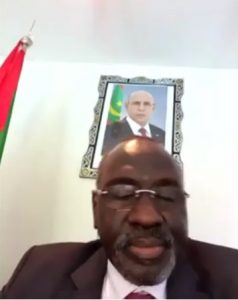
Mauritania
Mauritanian ambassador in Brasília, Wagne Abdoulaye, said that the relations between the two countries are excellent. “We have great trade and economic relations, and Mauritania could play a major role as a hub for Brazilian products in Maghreb and the African countries. We could play this role in strengthening Brazil-Africa relations,” he said.
Bahrain
Bahraini chargé d’affaires in Brasília, Bader Alhelaibi, was also featured in the webinar. “This is the most recent embassy in Brazil and managed to quickly triple the economic relations between the two countries,” Mansour said.
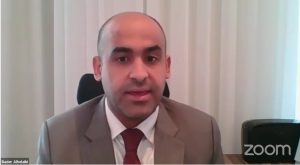
Alhelaibi reaffirmed the embassy’s commitment to support the efforts to strengthen the economic and trade relations between the countries and welcomed Brazilian investments in the region. “I’d like to mention that, due to its strategic location and laws that facilitate foreign investments, as well as its relations with the other Gulf markets, Bahrain is attractive for other investments. Our embassy supports visits between Brazilian and Bahraini businesspeople to learn about the opportunities in the two countries. It’s very important that we know each other and have the means to strengthen our relations,” he said. He finished saying that the embassy’s doors are always open for Brazilian investors.
Arab League
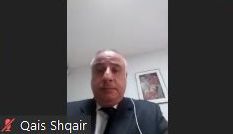
Ambassador Osmar Chohfi congratulated the League of Arab States for its 75th anniversary and invited the League ambassador in Brazil Qais Shqair to say a few words in the event. Shqair said that political work keeps up with economic work and pointed out that around 5% of the Brazilian population are of Arab descent. “There is also a long history of relations between the countries and Brazilian participation in Arab causes, and Brazil is very popular in the Arab world, which reflects in the economy. The Arab consumer prefers Brazilian products,” he said.
Politically speaking, Shqair pointed out that the Arab League has 22 Arab member countries and that Brazilian political and economic presence in these countries is very important. “The Brazilian economic presence in the Arab world is significant, but there should be a political presence too. I’d like to see more political and economic presence,” he said. He believes that Brazil could have a more active participation in the Palestinian cause. “Brazil could play a stronger role as a moderator to solve many Arab crisis, particularly in the Arab-Israeli conflict. This is the message I’d like to convey – I know that this webinar is focused on economic issues, but politics and the economy are interconnected,” he said.
Read more about the webinar:
Diplomacy made more relevant by Covid-19 crisis
Watch the full webinar.
Translated by Guilherme Miranda



